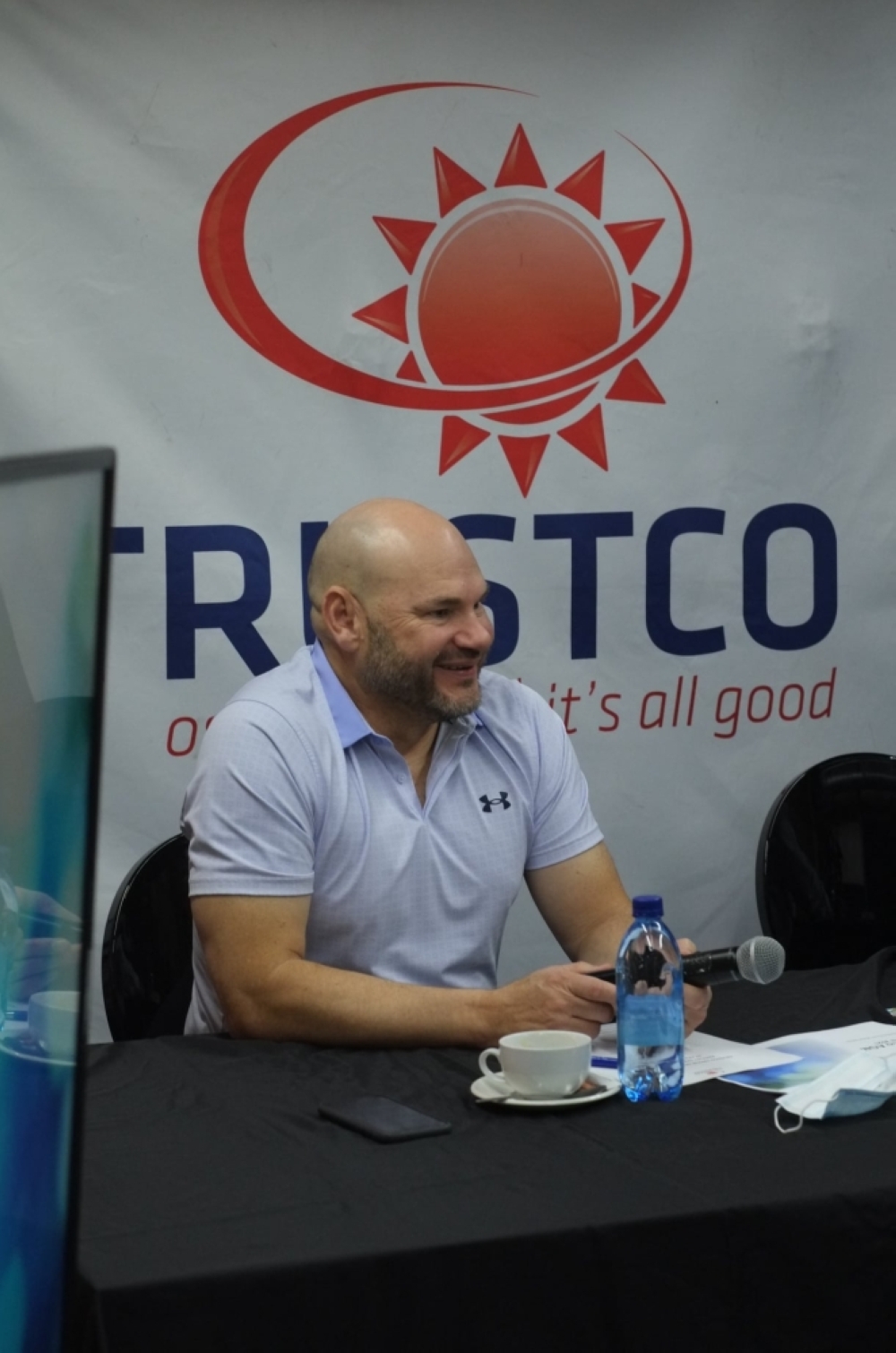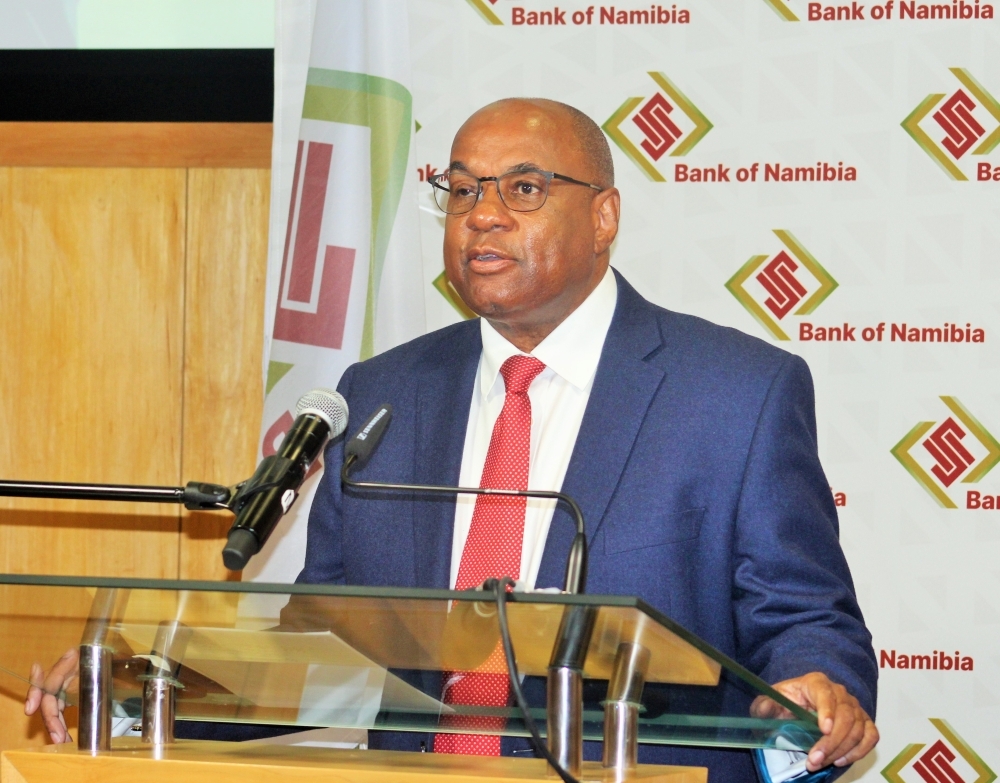Trustco Bank: Unpacking years of severe bleeding
BoN brings liquidation application
Trustco Bank yesterday assured its clients that their money was safe, but the Bank of Namibia maintains it is commercially insolvent.
The auditors of Grand Namibia and BDO Namibia have since 2019 been concerned about Trustco Bank Namibia’s (TBN) ability to continue as a going concern because of huge losses it has suffered.
By the end of last March, TBN was stranded with accumulated losses of about N$211.4 million.
The Bank of Namibia (BoN) this morning will bring an urgent High Court application for the liquidation of TBN, the central bank confirmed yesterday.
In a statement on Wednesday evening, BoN governor Johannes !Gawaxab said the central bank’s board “is of the view that TBN is commercially insolvent at this time”.
TBN is wholly-owned by Trustco Group Holdings (TGH). The managing director and CEO of the group, Quinton van Rooyen, owns 63.97% of TGH.
At the close of the Johannesburg Stock Exchange on Wednesday, Van Rooyen’s stake in the group was valued at about N$532 million.
Tumbling deposits
TBN yesterday tried to calm clients and stop them from withdrawing their money from the bank.
According to the latest available financial results, deposits at TBN amounted to about N$15 million on 31 March 2021. That is a drop of about 56% compared to its 2020 book-year.
TBN issued a statement, denying that it was commercially insolvent. Clients needn’t use the Namibia Deposit Guarantee Authority, which provides a guarantee for only N$ 25 000 per depositor, it said.
“All TBN client deposits are 100% backed by cash, and can be returned at the client’s request.”
‘Lies’
!Gawaxab said the BoN has engaged TBN over the past two years in an attempt to ensure regulatory compliance and, ultimately, the financial sustainability of the bank.
Measures recommended by the central bank include, among others, the recapitalisation of TBN, “which was not done in full as expected”, he said.
TBN recently furnished the BoN with financial projections and a business plan which it claimed would secure its sustainable turnaround.
On Monday, TGH issued a statement saying it offered to boost TBN’s balance sheet by “a further N$1 billion”. This offer was shot down by the central bank, the group said.
However, according to !Gawaxab: “Contrary to what is claimed, the BoN did not decline any offer of capitalisation of TBN by TGH.”
What the central bank did, he explained, was to give the group a detailed analysis of its proposed business plan and the reasons why it regarded the plan inadequate.
‘Unconstitutional’
Following extensive engagements between the BoN and TBN, the central bank’s board of directors, at a meeting on 5 September, had no other option than to resolve to apply to the High Court for the winding up of the bank, !Gawaxab said.
The BoN on 16 September informed TBN of its decision to pursue legal action.
On 23 September, TGH and TBN filed a notice of motion in the High Court to review several directives and decisions issued by the central bank against TBN since 25 July this year.
TGH and TBN allege that the BoN’s directives and decisions, based on the Banking Institutions Act, are unconstitutional.
The central bank on Monday evening reacted by saying it “will vigorously defend its supervisory actions”.
!Gawaxab on Wednesday evening added that the liquidation application was the culmination of a series of regulatory engagements and interventions that have failed to restore TBN’s governance and viability to acceptable regulatory levels since 2020.
‘Severe flaws’
“Some of the shortcomings identified over this period and not satisfactorily resolved by TBN and its shareholders include severe flaws in the bank's risk management practices and systems, its failure to maintain liquidity ratios within the prescribed ratios and a failure to comply with agreed-upon directives to recapitalise the institution,” !Gawaxab said.
“TBN continues to operate without an approved viable business plan and sufficient capital to carry out the plan, which is vital for the viability and sustainability of the business and is expected of all industry players."
The primary purpose of the winding-up application is to protect the bank’s depositors and creditors and to ensure that non-compliance with the applicable laws does not pose any further risks, he said.
Auditors
TBN’s website only contains its financial results since 2018. These show the bank has been suffering losses since then.
TBN’s accumulated losses at the end of its 2020 book-year amounted to about N$172.96 million, an increase of N$31.2 million or 22% compared to its previous financial year.
BDO Namibia, who audited the 2020 results, had then already raised a material uncertainty issue on going concern in its audit report. To remain a going concern, TGH committed to a capital injection of N$100 million over a three-year period.
In February 2021, the group injected N$33.3 million of this capital into TBN.
However, the bank’s accumulated losses grew by N$38.5 million or 22% to around N$211.4 million in the 2021 financial year.
Grand Namibia, auditors of the 2021 results, also raised a material uncertainty issue on going concern in its audit report and referred to the proposed capital injection of N$100 million.
By the end of last March, TBN was stranded with accumulated losses of about N$211.4 million.
The Bank of Namibia (BoN) this morning will bring an urgent High Court application for the liquidation of TBN, the central bank confirmed yesterday.
In a statement on Wednesday evening, BoN governor Johannes !Gawaxab said the central bank’s board “is of the view that TBN is commercially insolvent at this time”.
TBN is wholly-owned by Trustco Group Holdings (TGH). The managing director and CEO of the group, Quinton van Rooyen, owns 63.97% of TGH.
At the close of the Johannesburg Stock Exchange on Wednesday, Van Rooyen’s stake in the group was valued at about N$532 million.
Tumbling deposits
TBN yesterday tried to calm clients and stop them from withdrawing their money from the bank.
According to the latest available financial results, deposits at TBN amounted to about N$15 million on 31 March 2021. That is a drop of about 56% compared to its 2020 book-year.
TBN issued a statement, denying that it was commercially insolvent. Clients needn’t use the Namibia Deposit Guarantee Authority, which provides a guarantee for only N$ 25 000 per depositor, it said.
“All TBN client deposits are 100% backed by cash, and can be returned at the client’s request.”
‘Lies’
!Gawaxab said the BoN has engaged TBN over the past two years in an attempt to ensure regulatory compliance and, ultimately, the financial sustainability of the bank.
Measures recommended by the central bank include, among others, the recapitalisation of TBN, “which was not done in full as expected”, he said.
TBN recently furnished the BoN with financial projections and a business plan which it claimed would secure its sustainable turnaround.
On Monday, TGH issued a statement saying it offered to boost TBN’s balance sheet by “a further N$1 billion”. This offer was shot down by the central bank, the group said.
However, according to !Gawaxab: “Contrary to what is claimed, the BoN did not decline any offer of capitalisation of TBN by TGH.”
What the central bank did, he explained, was to give the group a detailed analysis of its proposed business plan and the reasons why it regarded the plan inadequate.
‘Unconstitutional’
Following extensive engagements between the BoN and TBN, the central bank’s board of directors, at a meeting on 5 September, had no other option than to resolve to apply to the High Court for the winding up of the bank, !Gawaxab said.
The BoN on 16 September informed TBN of its decision to pursue legal action.
On 23 September, TGH and TBN filed a notice of motion in the High Court to review several directives and decisions issued by the central bank against TBN since 25 July this year.
TGH and TBN allege that the BoN’s directives and decisions, based on the Banking Institutions Act, are unconstitutional.
The central bank on Monday evening reacted by saying it “will vigorously defend its supervisory actions”.
!Gawaxab on Wednesday evening added that the liquidation application was the culmination of a series of regulatory engagements and interventions that have failed to restore TBN’s governance and viability to acceptable regulatory levels since 2020.
‘Severe flaws’
“Some of the shortcomings identified over this period and not satisfactorily resolved by TBN and its shareholders include severe flaws in the bank's risk management practices and systems, its failure to maintain liquidity ratios within the prescribed ratios and a failure to comply with agreed-upon directives to recapitalise the institution,” !Gawaxab said.
“TBN continues to operate without an approved viable business plan and sufficient capital to carry out the plan, which is vital for the viability and sustainability of the business and is expected of all industry players."
The primary purpose of the winding-up application is to protect the bank’s depositors and creditors and to ensure that non-compliance with the applicable laws does not pose any further risks, he said.
Auditors
TBN’s website only contains its financial results since 2018. These show the bank has been suffering losses since then.
TBN’s accumulated losses at the end of its 2020 book-year amounted to about N$172.96 million, an increase of N$31.2 million or 22% compared to its previous financial year.
BDO Namibia, who audited the 2020 results, had then already raised a material uncertainty issue on going concern in its audit report. To remain a going concern, TGH committed to a capital injection of N$100 million over a three-year period.
In February 2021, the group injected N$33.3 million of this capital into TBN.
However, the bank’s accumulated losses grew by N$38.5 million or 22% to around N$211.4 million in the 2021 financial year.
Grand Namibia, auditors of the 2021 results, also raised a material uncertainty issue on going concern in its audit report and referred to the proposed capital injection of N$100 million.






Comments
Namibian Sun
No comments have been left on this article